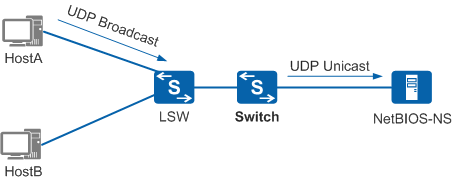Overview of UDP Helper
Background
Hosts on a network may need to obtain the network configuration or resolve host names by sending UDP broadcast packets to the server. If the hosts and server are located in different broadcast domains, UDP broadcast packets cannot reach the server and the hosts cannot obtain the required information from the server.
The switch provides the UDP helper function to solve this problem. UDP helper can relay the UDP broadcast packets with specified destination ports. It converts the broadcast packets into unicast packets and sends the unicast packets to the specified destination servers.
As shown in Figure 1, HostA uses a host name to access HostB, and the NetBIOS Name Service (NetBIOS-NS) server resolves the host name of HostB. The NetBIOS-NS server and HostA are in different broadcast domains, so the UDP broadcast packet with destination port UDP 137 sent by HostA cannot reach the NetBIOS-NS server. After UDP helper is enabled on the Switch, the Switch can forward the packet with destination port UDP 137 to the NetBIOS-NS server through unicast so that the NetBIOS-NS server can resolve the host name of HostB.
Packets Forwarded by UDP Helper
The packets that can be forwarded by UDP helper must meet the following requirements:
- The destination MAC address is the broadcast MAC address (ffff-ffff-ffff).
- The Time-to-Live (TTL) value is larger than 1.
- The protocol type is UDP.
- The destination port is a specified UDP port.
UDP Helper Ports
After UDP helper is enabled on the switch, the switch relays the UDP packets with six specified destination ports by default. Manual configuration is required if the switch needs to relay the UDP packets with other destination ports. The switch supports a maximum of 16 UDP ports including the 6 port numbers supported by default after UDP helper is enabled.
Protocol |
UDP Port Number |
|---|---|
Trivial File Transfer Protocol (TFTP) |
69 |
Domain Name System (DNS) |
53 |
Time Service |
37 |
NetBIOS Name Service (NetBIOS-NS) |
137 |
NetBIOS Datagram Service (NetBIOS-DS) |
138 |
Terminal Access Controller Access Control System (TACACS) |
49 |

UDP helper enables a device to relay DHCP packets destined for UDP port 67 (that is, DHCP packets sent to the DHCP server).
However, a UDP helper-enabled device cannot relay DHCP packets destined for UDP port 68 (that is, DHCP packets sent to the DHCP client). To relay this type of DHCP packets, you must enable the DHCP relay function.
